|
|
|
Sort Order |
|
|
|
Items / Page
|
|
|
|
|
|
|
| Srl | Item |
| 1 |
ID:
138260
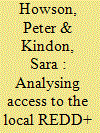

|
|
|
|
|
| Summary/Abstract |
The Reducing Emissions from Deforestation and Forest Degradation (REDD+) project in Sungai Lamandau was Indonesia's first forest carbon finance initiative officially proposed by a community group upon land they intended to control autonomously. However, the flagging carbon market and government licensing obstructions stalled progress towards possible monetary gains. With a focus on the agency of local farmers, we explore the ‘bundles of powers’ that they mobilised to access the other diverse and, at times, elusive set of benefits within the REDD+ project. In the absence of a formal tenure and ‘carbon rights’ regime, local actors' ability to benefit from the project was dependent on social relationships, REDD+ knowledge and access to local markets and capital. The result was a benefit-sharing framework of uneven distribution.
|
|
|
|
|
|
|
|
|
|
|
|
|
|
|
|
| 2 |
ID:
180699
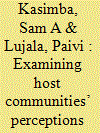

|
|
|
|
|
| Summary/Abstract |
Mining companies increasingly adopt trusts, foundations, and funds as part of their efforts to obtain and maintain a social license to operate and corporate social responsibility (CSR) strategies for community development. Using qualitative methodology, this article examined host communities’ perceptions of two mining company-financed trust funds in Ghana. The interviews revealed that although the community members considered some aspects of the trust funds positively, the trust funds’ overall objectives to promote meaningful participation of local community members and contribute to local development had not been met. Inadequate planning and needs assessments, and inflexibility in externally framed CSR practices that were unfavorable to the operational contexts, were among the key factors undermining the success of the trust funds.
|
|
|
|
|
|
|
|
|
|
|
|
|
|
|
|
| 3 |
ID:
157171
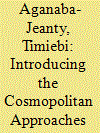

|
|
|
|
|
| Summary/Abstract |
Third World Approaches to International Law or TWAIL is a useful starting point to assess space governance issues from the perspective of emerging or aspirant space actors and users because it helps to highlight imbalances and asymmetry around the supposed “legal right” to space benefit under Article I(1) of the Outer Space Treaty. However, a new analytical lens focused on Cosmopolitan Approaches to International Law or CAIL is proposed that can deconstruct the existing agenda in light of it obscuring the idea of shared benefits without attributing blame, scepticism or negativity, a charge often placed against TWAIL perspectives. This paper asks what one learns from the space law context that prompts us to reorient the frame of analysis that TWAIL perspective brings to bear and focus on a CAILian perspective. Primarily that a TWAILian approach is too one sided and polarized and that a CAILian approach acknowledges reciprocal responsibilities. It highlights the implications of the approach both for emerging and aspirant as well as established space nations specifically and for global space governance in general.
|
|
|
|
|
|
|
|
|
|
|
|
|
|
|
|
| 4 |
ID:
147516
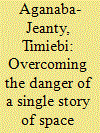

|
|
|
|
|
| Summary/Abstract |
space governance issues from the perspective of emerging or aspirant space actors and users because it helps to highlight imbalances and asymmetry around the “legal right” to space benefit under Article I(1) of the Outer Space Treaty. However, a new analytical lens focused on Cosmopolitan Approaches to International Law or CAIL is proposed that can deconstruct the existing agenda in light of it obscuring the idea of shared benefits without attributing blame, scepticism or negativity. In the quest to ensure fairness to all, including aspirant emerging space actors, largely from developing States, this paper asks what does one learn from the space law context that prompts us to reorient the frame of analysis that Third World Approaches to International Law (TWAIL) perspective brings to bear and focus on a CAILian perspective? Primarily that a TWAILian approach is too one sided and polarized. A CAILian approach however acknowledges reciprocal responsibilities. In conclusion, I am not making a claim here that my CAILian concept has never been articulated before. However, the way I link the concept of Cosmopolitanism with a school of thought that I am sympathetic to (TWAIL) is where this paper provides a novel idea. My specific version of Cosmopolitanism bears in mind the importance of collective ideas. While CAIL will not be free from power asymmetry's because there will always be polarity; it still chooses to focus on the middle ground and not to focus on extremes.
|
|
|
|
|
|
|
|
|
|
|
|
|
|
|
|
| 5 |
ID:
100068
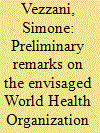

|
|
|
|
|
| Publication |
2010.
|
| Summary/Abstract |
Over the last few decades, the World Health Organization (WHO) has played a significant role in the prevention and control of new strains of influenza virus in the human population. Beginning in the 1950s, it has coordinated a network of WHO-linked laboratories, charged with monitoring the changes in influenza viruses and favouring the timely sharing of virus samples, which is necessary for the development and production of vaccines. In December 2006, the said system was brought into question by Indonesia, according to which it was unfair and in conflict with the principle of state sovereignty over biological and genetic resources. Although very controversial, the Indonesian decision to interrupt the supply of candidate influenza vaccine strains boosted intergovernmental negotiation, until then not achieved, aimed at establishing a new WHO framework. This article examines the outcome of such a negotiation, as well as the aspects of the framework still under discussion. It emphasizes the innovative nature of the proposed benefit-sharing mechanism, which would promote access to vaccines mainly through the multilateralization of intellectual property rights governance. Similarities and differences between the envisaged framework and the benefit-sharing mechanism established by the Food and Agricultural Organization International Treaty on Plant Genetic Resources for Food and Agriculture in the field of access to plant genetic resources are analysed.
|
|
|
|
|
|
|
|
|
|
|
|
|
|
|
|
| 6 |
ID:
121838
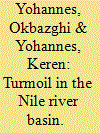

|
|
|
|
|
| Publication |
2013.
|
| Summary/Abstract |
Since the end of the Cold War, the Nile co-basin states have been moving towards constructing a regional water governance regime. The focus has been on how to promote cooperative harmonization of the water needs and growth priorities of all basin countries. Unfortunately, the effort appears to have come to a screeching halt, resuscitating old fears of potential inter-riparian conflicts. This paper examines the evolution of contentious politics of hydrology in the Nile basin in light of the regional and international approaches that have hitherto been employed to bring the co-basin states together on the importance of peaceful utilization of Nile waters.
|
|
|
|
|
|
|
|
|
|
|
|
|
|
|
|
| 7 |
ID:
121828
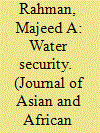

|
|
|
|
|
| Publication |
2013.
|
| Summary/Abstract |
This article examines the transboundary water challenges among riparian states in and around the Nile river basin. The article argues in agreement with the Collier-Hoeffler conflict model (1998) which claims that Africa's natural endowments, such as diamonds, gold, copper, bauxite, and oil, are strong predictors of violent conflict in Africa. This article further posits that these natural economic endowments, such as natural resources and geographical locations which include the Nile river basin, are potential triggers of conflict in the horn of Africa.
|
|
|
|
|
|
|
|
|
|
|
|
|
|
|
|
|
|
|
|
|